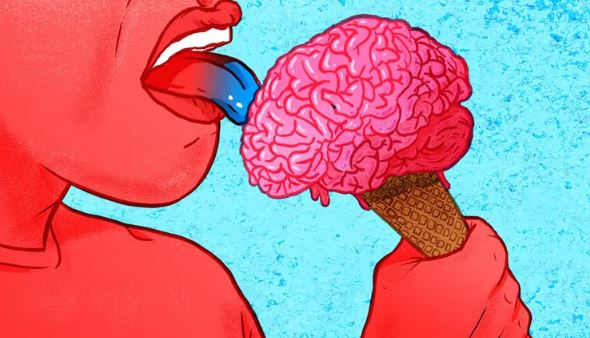
Brain freezes are also known as ice cream headaches or sphenopalatine ganglioneuralgia.
Brain freeze is a sudden, sharp pain that rockets through your head after taking in something icy cold.
The pain can leave you reaching for anything warm in a desperate attempt to make it stop.
Before we discuss relief strategies, let’s understand what’s happening inside your head when a brain freeze hits. The culprit behind that icy jolt of pain is a surprising one: your blood vessels.
When you consume something very cold, especially something that comes into direct contact with the roof of your mouth (the sphenopalatine ganglion), those blood vessels in your brain rapidly constrict. This sudden change in blood flow triggers a headache-like pain sensation.
Thankfully, brain freezes are temporary and usually resolve within a minute or two. The bad news? They sure don’t feel good in the moment!
What causes brain freeze?
While ice cream is a common culprit, brain freezes aren’t exclusive to those. Here are some other things that can trigger this icy headache:
- Very cold drinks: Slushies, iced teas, and even super chilled water can all cause brain freezes.
- Certain foods: Mint candies and popsicles can also trigger the constriction of blood vessels, leading to that familiar pain.
- Rapid temperature changes: Moving quickly from a hot environment to a cold one can sometimes cause a brain freeze.
How to prevent a brain freeze
Prevention is always better than cure, so here are some tips to avoid that brain-chilling pain:
- Enjoy your icy snacks slowly. Savour each bite or sip, allowing your body to adjust to the cold temperature.
- Don’t gulp. Large gulps of cold beverages are more likely to trigger a brain freeze than taking smaller sips.
- Let your ice cream soften for a few minutes before diving in, or warm up your beverage slightly before taking a big gulp.
- Avoid switching rapidly between hot and cold environments. If you’re heading into a chilly space after being outside in the heat, take a moment to adjust before grabbing a cold drink.
How to get rid of a brain freeze
Here are some ways to find relief from that icy pain:
- Apply warmth: The key is to bring warmth back to the area where the blood vessels have constricted. Press your tongue against the roof of your mouth, where the cold initially hit. Alternatively, hold a warm compress against your forehead or cheeks.
- Sip warm liquids: Warm water, milk, or even hot tea can help to gradually raise the temperature in your mouth and promote blood flow.
- Breathe deeply: Taking slow, deep breaths can help to relax your body and potentially ease the pain.
When to seek medical attention
Brain freezes are typically harmless and resolve quickly. However, if you experience frequent or severe brain freezes, or if they are accompanied by other concerning symptoms like numbness, weakness, or dizziness, it’s best to see a doctor to rule out any underlying medical conditions.

